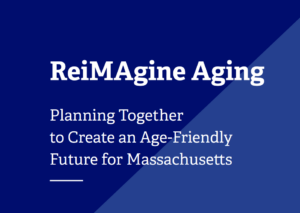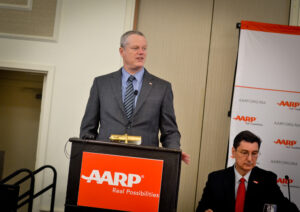By Debra Roberts, Contributing Writer

Photo/Lucyus Fevrier/CC BY-NC-SA 4.0
The state of Massachusetts is trying to change the approach to aging in its 351 towns and cities.
“We need to think differently about aging in Massachusetts,” said Governor Charlie Baker during his 2018 State of the Commonwealth address. “This isn’t just about acknowledging a shift in demographics. It’s about being intentional in our planning to ensure that those who grew up here, raised families and built communities, can continue to contribute their energy, experience and talents where they live and make Massachusetts the most age-friendly state.”
Governor’s Council to Address Aging in Massachusetts
Baker’s Council to Address Aging was launched in 2017. Consisting of 24 members from government, business, non-profit, health and education sectors, the council was tasked with creating an actionable blueprint for promoting healthy aging in Massachusetts. It held meetings throughout the state, receiving input from expert panels.
Nora Moreno Cargie, President of Tufts Health Foundation, an organization that provides funding and support for age-friendly policies and practices, is a member of the council. She traveled with council members throughout the state to conduct listening sessions. They heard from over 500 Massachusetts residents who provided input for the council’s action plan.
“To be able to make a plan that was reflective of all of those various voices was very rewarding to me as a council member,” Cargie said.
ReiMAgine Aging – the Age-Friendly Massachusetts Action Plan
 The multiyear plan, called ReiMAgine Aging, was designed to build on the momentum of the already growing age-friendly and dementia-friendly movement across the Commonwealth.
The multiyear plan, called ReiMAgine Aging, was designed to build on the momentum of the already growing age-friendly and dementia-friendly movement across the Commonwealth.
Baker presented the initial blueprint for ReiMAgine Aging to AARP Massachusetts Director Mike Festa in 2018. At the council’s recommendation, he committed to joining AARP’s Network of Age-Friendly States and Communities. This network is a worldwide effort initiated by the World Health Organization to address the world’s population growth of those over 60. AARP became the US affiliate in 2012. Though cities and towns across the US had joined this network, Massachusetts was only the second state to join, after New York.
Age-Friendly impacts on communities
So, what exactly does it mean to be age-friendly? Well, it depends on who you ask.
“What’s needed in the Berkshires is very different from what’s needed in Boston,” Cargie said. “It’s approaching communities with inquiry and curiosity and not a bunch of assumptions. We have the opportunity to support what communities really want and we want to do it in a way that reflects that,” she explained.
The AARP age-friendly designation lists eight domains of livability to make a community more livable for people of all ages: outdoor spaces and buildings, transportation, housing, social participation, respect and social inclusion, work and civic engagement, communication and information, and community and health services.
But this is just a framework. Communities are free to come up with their own plan. The designation is a commitment, within two years, to complete a community assessment and establish an action plan based on community needs identified within the eight domains of livability.

Photo/Lucyus Fevrier/CC BY-NC-SA 4.0
Antron Watson, who is the Age-Friendly Director for AARP Massachusetts, helps with the process of designating a town or city in AARP’s age-friendly network. He has seen the positive changes across the state with the age-friendly movement, noting that Massachusetts has the most AARP age-friendly communities.
“What I’ve seen is communities taking more time to listen to their residents’ needs,” he said. “When we look at how our communities are built—the older voice sometimes gets ignored. This initiative has brought to light that their concerns are real, and that what they are saying not only benefits them but everyone else in the community.”
Massachusetts Healthy Aging Collaborative
 James Fuccione, director of the Massachusetts Healthy Aging Collaborative (MHAC), has also been encouraged by the movement, which he said has led to about 150 age-friendly designated towns in the state.
James Fuccione, director of the Massachusetts Healthy Aging Collaborative (MHAC), has also been encouraged by the movement, which he said has led to about 150 age-friendly designated towns in the state.
“State funding opportunities can put an age- and dementia-friendly lens on funding,” said Fuccione. “So that when communities think about how to make their community more walkable or redo an intersection, they’re thinking about infrastructure. The physical environment around councils on aging, around senior housing and even the downtown district—how is it accessible to everybody and inclusive?”
MHAC, which is made up of over 100 agencies and organizations that are involved in the age-friendly movement, has a comprehensive website with tools that can be used to educate other organizations or the public. It also indicates whether your town or city has begun an age-friendly initiative. If it hasn’t, the site has a tool kit on how to get one going.
“People have an opportunity to get involved in their communities to kickstart something that might not be around,” Fuccione explained.
To explore data about your individual city or town or aging- and dementia- related topics in the Commonwealth, visit mahealthyagingcollaborative.org.
To inquire about any age-related services, visit MassOptions.org or call 1-800-243-4636.
To read the ReiMAgine Aging 2021 progress report click here.
RELATED CONTENT:
AARP Awards Four Massachusetts Organizations with Community Grants (fiftyplusadvocate.com)
I’m Still Here engages, gives hope to people living with dementia (fiftyplusadvocate.com)












